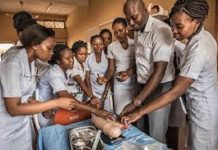In commemoration of this year’s World Malaria Day and World Tuberculosis Day, held 24 March and 25 April of every year respectively, no fewer than four schools in Egbeda area of Lagos State benefitted from the Association of Lady Pharmacists (ALPs), Lagos State Chapter’s Public Secondary Schools Intervention Programme.

Beneficiary schools included State Comprehensive Senior College, Egbeda; State Comprehensive Junior College, Egbeda; State Senior High School, Egbeda; and State Junior High School, Egbeda.
The programme, which held within the premises of State Senior High School in Egbeda, was centered on moral education, environmental health, gender mainstreaming, drug abuse and misuse, personal hygiene advocacy, malaria awareness and sensitisation on tuberculosis.
Speaking at the event, the ALPs chairperson, Pharm. Modupe Ologunagba, advised the students to shun irrational use of drugs, drug misuse and abuse, as well as other unwholesome conducts, so as to safeguard their future and reduce the burden of diseases in the society, adding that it is a practical step towards achieving good health and living a healthy life.
Ologunagba, who is also a lecturer in the Faculty of Pharmacy, University of Lagos, said the association’s motive for organising the programme was to join other well-meaning associations and the world at large to commemorate this year’s world malaria and tuberculosis days, adding that the programme was very important as it was aimed at catching the students young and ensuring that they knew some relevant things regarding their health and moral values before reaching adulthood.
She explained that issues like malaria prevention, tuberculosis awareness, environmental health and others should not be handled with kid’s glove, hence the need to expose youngsters to such messages.
While taking the students on “Malaria Awareness Lecture”,treasurer of the association, Pharm. (Mrs) Rosemary Achi-Kanu, called on the students to protect themselves from the scourge of malaria.
She explained that malaria is a disease caused by the plasmodium parasite which infects the red blood cells and is characterised by fever, body ache, chills and sweating, adding that of the four species that cause malaria, plasmodium falciparum is the most serious and can cause serious complications
She explained further that after being bitten by an infected mosquito, the disease takes around 14 days to manifest, adding that the commonly observed symptoms are fever, headache, chills, sweats, fatigue nausea and vomiting.
“These are just some of the common symptoms of malaria,” Achi-Kanu noted. “Some of the other symptoms include dry cough and muscle pain; and if you have been diagnosed with the disease, you should take adequate rest until and also see a medical expert.”
In another lecture at the event, Pharm. Adenike Oluronbi, who spoke on “Tuberculosis Prevention and Management”, explained that tuberculosis, popularly called TB, is a disease caused by the bacterium Mycobacterium tuberculosis which mainly infects the lungs, but can equally attack other organs of the body.
“When someone with untreated TB coughs or sneezes, the air is filled with droplets containing the bacteria. Inhaling these infected droplets is the usual way a person gets TB.” She explained, adding that “only people who have active TB infections can spread the TB bacteria. Coughing, sneezing, even talking can release the bacteria into the surrounding air, and people breathing this air can then become infected. This is more likely to happen if you’re living in close quarters with someone who has TB or if a room isn’t well ventilated. Once a person is infected, the bacteria will settle in the air sacs and passages of the lungs and, in most cases, will be contained by the immune system.”
According to Achi-Kanu, the common symptoms of TB include coughing that lasts longer than two weeks with green, yellow, or bloody sputum; weight loss; fatigue; fever; night sweats; chills; chest pain; shortness of breath and loss of appetite. She however added that the occurrence of additional symptoms depends on where the disease has spread beyond the chest and lungs.
Asked if TB was treatable, the ALPs treasurer said all forms of TB were curable if they were diagnosed and treated in time, adding that treatment involved taking a combination of drugs for six to nine months because some tuberculosis bacteria are naturally resistant to one or more of the drugs prescribed. She added that the most important thing to do was to finish entire courses of medication when they are prescribed.
Explaining further, she said: “Treatment for TB depends on whether a person has active TB disease or only TB infection. If you have become infected with TB, but do not have active TB disease, you may get preventive therapy. This treatment kills germs that are not doing any damage right now, but could so do in the future; but if you have active TB disease, you will probably be treated with a combination of several drugs for six to 12 months. You may only have to stay a short time in the hospital, if at all, and can then continue taking medication at home. After a few weeks you can probably even return to normal activities and not have to worry about infecting others.”
Also speaking with the students on “Drug Misuse and Abuse among Nigerian Adolescents”, Pharm. (Mrs) Oluwakemi Charles-Okeh called on the students to always be cautious of what they swallowed in the name of drug taking, saying the menace of drug misuse and abuse had eaten deep into the society, especially among adolescents.
“A drug refers to a substance that could bring about a change in the biological function through its chemical actions. Drugs could thus be considered as chemical modifiers of the living tissues that could bring about physiological and behavioural changes,” Pharm. Charles-Okeh explained.
She therefore advised the students not to handle or use drugs without prescription from medical experts, saying drug misuse is an act of taking drugs in an improper way.
“When one fails to take the drug in accordance with an expert’s instruction, it is drug misuse.Drug abuse, on the other hand, is the process of taking drugs for a wrong purpose which is very dangerous, because drugs are not meant to be taken anyhow.So you must stay away from drugs like cocaine, heroin and even marijuana because they would do you no good; rather they can destroy your life.”
She also attributed the causes of drug abuse in adolescents to include factors such as curiosity to experiment, peer pressure, lack of parental supervision, personality problems due to socio-economic conditions, the need for energy to work for long hours, availability of the drugs and the need to prevent the occurrence of withdrawal symptoms, among others.
Pharm. Charles-Okeh also pointed out that most students, especially those in the secondary school, tend to see a drug user as one who is tough, bold and strong, adding that many of them have been known to use drugs at the instance of peers, elders or siblings.
She however advised that since the problem is more prevalent among those who are ignorant of the dangers inherent in drug abuse, effective counselling and proper awareness among the affected group would be pivotal.
In her own contribution, Pharm. (Mrs) Mfon Nsese, who spoke on “Environmental Health and Education Pursuit,” advised the students on some steps they couldtake to achieve complete wellness, including eating good food, engaging in proper exercise and maintaining a clean environment.
“Environmental health is very important and it comprises those aspects of human health, including quality of life, that are determined by physical, chemical and biological social and psychological factors,” Nsese said.
She noted that environmental pollution was one of the challenges that could adversely affectthe health of people and future generations.
“The environmental pollution can be air pollution, land pollution, water and noise pollution; but they have a greater effect on the conduciveness of an environment and therefore should be properly controlled or managed,” Nsese advised.
While thanking ALPs on behalf of all the participating schools, the Vice principal, State Senior High School, Mr C.A Olajide, said the programme was apt, adding that the best time for the young ones to be built for future challenges was when they were still in their teenage years.
“They are the leaders of tomorrow and when the foundation is very strong, it helps the future; but if the foundation is faulty from the beginning, it means there is danger ahead; so teaching them about their health, as well as moral and environmental health at this stage is good. We are hopeful that what they have heard today will help them in life, and by the time they grow up, it would be part and parcel of them.”










